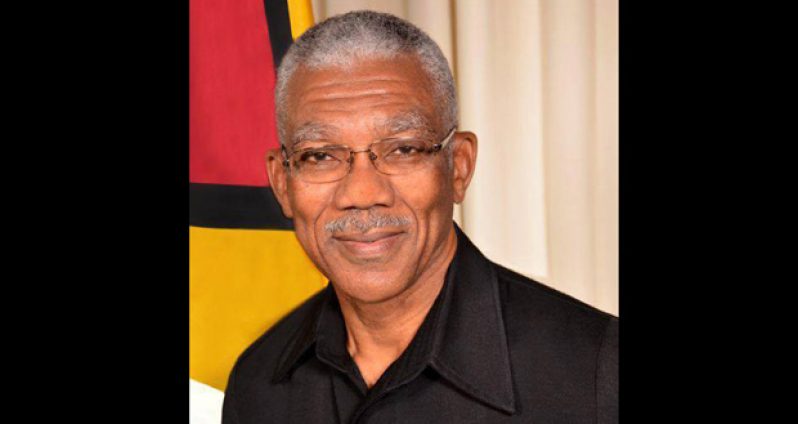– President Granger
PRESIDENT David Granger is of the opinion that an integrated approach just might be the answer we’re looking for where dealing with inter-personal violence is concerned.Coming in the wake of growing concerns over the high incidence of domestic violence here, the president made known his position on the issue on Friday evening on his weekly televised programme, the Public Interest.
“I don’t think the Police Force on its own can solve the problem; the Government on its own cannot solve the problem,” President Granger said.
According to the Guyana Police Force, the year to date has seen a 20 per cent reduction in serious crimes, but the fly in the ointment still remains interpersonal violence, which, in some cases, has led to murder.
Indeed, just two weeks ago, 28-year-old Suresh Ganesh was taken into custody after murdering his reputed wife and their two-year-old son at their Lot 57 Best Village, West Coast Demerara (WCD) home.
The woman, Vanessa Sukhram-Persaud, was found on a blood-soaked mattress with her neck almost severed, and chops to her jaw, arms and fingers. Her son, Joel Ganesh, was found lying next to her with his intestines protruding.
The Venessa Sukhram-Persaud story is just one of many stories engaging the attention of the Guyana Police Force with respect to domestic violence. And as the president has said, the police cannot do it alone; a national approach is needed, whereby all stakeholders need to get involved to bring an end to this scourge.
So, to get the proverbial ball rolling, he has advised the National Security Committee to solicit the support of sociologists and other experts in the field to determine the underlying causes and possible solutions.
CRIME-WAVE FALLOUT
He believes that the situation being experienced in today’s Guyana is a consequence of the crime wave visited on this nation from 2000 to 2010.
He said while some children still see the bullet holes in their houses, the memory of dead bodies in the streets of their villages, and the sounds of gunshots fired still remain fresh in the minds of others.
Noting that the violence perpetrated has left permanent scars, President Granger said, “What we are seeing now is the secondary impact; once you have endured such intense violence for so long, it is difficult to escape the psychological consequences.”
He is of the opinion that there may be attempts to replicate the violence which was meted out the during the crime wave, under the misguided impression that crime is the best way to solve a problem.
Guyana must now re-educate its young people, he said, to undo the sociological and psychological damage done. “So, we now have to re-educate many of the young people who would have witnessed those crimes, or who were affected by the headlines, or might have been victims or their relatives might have been victims,” President Granger said during the 30-minute programme.
ALL HANDS ON DECK
Noting that the religious community, the education sector, and even the family all have a critical role to play in this regard, the president said:
“We need to start teaching conflict-resolution skills, anger management skills within our schools. And I would ask that the main religious organisations, Christianity, Hinduism, Baha’i, Islam and even the Rastafarian faith to deal with anger management and help young people manage their relationships.”
Attention, he said, must also be paid to the scourge of suicide.
Some 75 per cent of suicides occur in low and middle-income countries, and more than 800,000 people around the world die from suicide every year. This works out to approximately one person every 40 seconds, according to the World Health Organization (WHO).
Guyana has the highest estimated suicide rate in the world. Data from the Americas show that suicide rates first peak among young people, remain at the same level for other age groups, and rise again among older men.
Pesticide poisoning is one of the most common methods of suicide, especially in low and middle-income countries, and accounts for one-third of cases globally. In the last 45 years, suicide rates have increased by 60 per cent worldwide.












